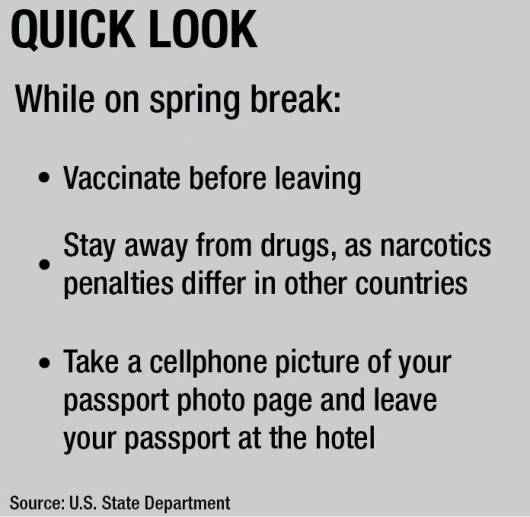The first time Khalifa Miller saw a beach was during spring break 2014, when he and three friends took a road trip to Panama City Beach, Fla.
“It was pretty awesome,” the third-year in physics said.
For Miller and his friends, looking up safety information on their U.S. destination wasn’t something that crossed their minds.
“We just randomly went down there,” he said. “It was a fun time.”
But for those traveling abroad, looking up crucial information on safety and good practices can save a lot of trouble.
The Department of State’s bureau of consular affairs will share tips for smart travel during a Google Hangout at 1 p.m. Thursday.
The Google hangout will share “tips and tricks for having a fun and safe spring break,” said Andrew Ellis, a country officer in the Office of American Citizens Services and Crisis Management.
Three of the top-ten spring break destinations — as nominated and ranked by Cheaptickets.com staff using booking information for the period — are outside the U.S., including Cancun, Mexico; Los Cabos, Mexico; and Nassau, Bahamas.
“We want our students to be prepared, be informed and be safe,” Ellis said. Participating in the hangout will be Stephanie Yoder, solo-travel blogger and editor of “twenty-somethingtravel.com” and two State Department employees, volun-tourism coordinator Mary Dykstra and travel-safety expert Rachel Crawford.
“I don’t think students are necessarily more vulnerable, as long as they are aware of their surroundings and don’t overindulge in alcohol and use illegal drugs,” Ellis said.
An important part of being prepared and informed, Ellis said, is to visit the bureau of consular affairs’ website, travel.state.gov, and sign up for the Smart Traveller Enrollment Program.
The website offers “specific information for every country in the world,” Ellis said, which is “updated by us on a minimum of a yearly basis.”
The website displays information on country-specific passport and visa requirements, recommended or mandatory vaccinations, as well as safety information, Ellis said.
The Department currently has travel warnings and alerts for 42 countries or areas of the globe, according to its website.
A travel warning can remain in effect for several years and is issued when the Department of State thinks travelers should reconsider going to the country at all. Reasons for issuing a travel warning include a civil war, frequent terrorist attacks, unstable governments and ongoing intense crime or violence, the website said. Countries currently under a travel warning include Iran, Libya, Ukraine, Mexico and North Korea.
A travel alert, on the other hand, is issued for short-term events, such as demonstrations, strikes or disturbances, a health alert or outbreak, or evidence of increased risk of terrorist attacks. Travel alerts can be canceled when a possible threat is over, the website said. Areas currently under a travel alert include parts of West Africa because of the Ebola virus and the South Pacific because of weather associated with the tropical cyclone season.
Gabby Tobin, a second-year in psychology, said she will leave for Cancun with her roommate on Friday.
“We wanted to get out, de-stress,” she said.
Tobin said they looked up hotel and crime information on a privately operated website. She said she never heard of the State Department’s website, but will check it out.
Although the State Department has a travel warning for parts of Mexico because of threats to safety and security posed by organized criminal groups, it continues to be the No. 1 foreign destination for U.S. citizens traveling overseas, Ellis said. However, a travel warning itself can mean many different things and does not necessarily cover the whole country, he added.
“We ask that people look in the travel warning to see what specific areas they should avoid,” he said, adding that in the case of Mexico, students will probably not run into problems in tourist areas.
“But there are certain areas along the border, for instance, that we do recommend that people stay away from,” he said.
Additionally, to be fully prepared, the Smart Traveler Enrollment Program allows the Department of State to communicate with students if there is a change in the country’s security situation while they are there, Ellis said.
Students can sign up for the Smart Traveler Enrollment Program on the department’s website, and the security messages will be sent via email.
“It’s only specific for the country and the time period for which you’ll be in that country,” Ellis said. “Most of the time we never have to contact our enrollees.”
While students enjoy their time away from school and work, the Columbus Division of Police and community organizations help to make sure that left-behind houses and belongings stay as safe as their traveling owners.
When it comes to the safety and security of students’ homes, Columbus Police Deputy Chief Tom Quinlan said within logistical limits, police will step up patrolling in the off-campus area.
Columbus police are also likely to “use more plainclothes in the area” to watch for suspicious activities, he said.
Quinlan said locking doors and windows, as well as putting valuables out of sight, are the most important pieces of security advice for spring break travel, adding that Columbus Police will also put special efforts into patrolling the area during break.
Ezra Baker, co-director of the Student Life Community Ambassadors and a third-year in economics and French, said there are resources available at the Ohio Union that can help keep off-campus houses safe.
“If you don’t have a security system, our office offers free window and door alarms through Neighborhood Services and Cooperation,” Baker said.
Students can get as many window and door alarms as they want at no cost, Baker said. The office also gives out electrical timers for lights and televisions.
The devices can be picked up at Ohio Union, room 3106, Monday through Friday, 8 a.m. to 6 p.m.


